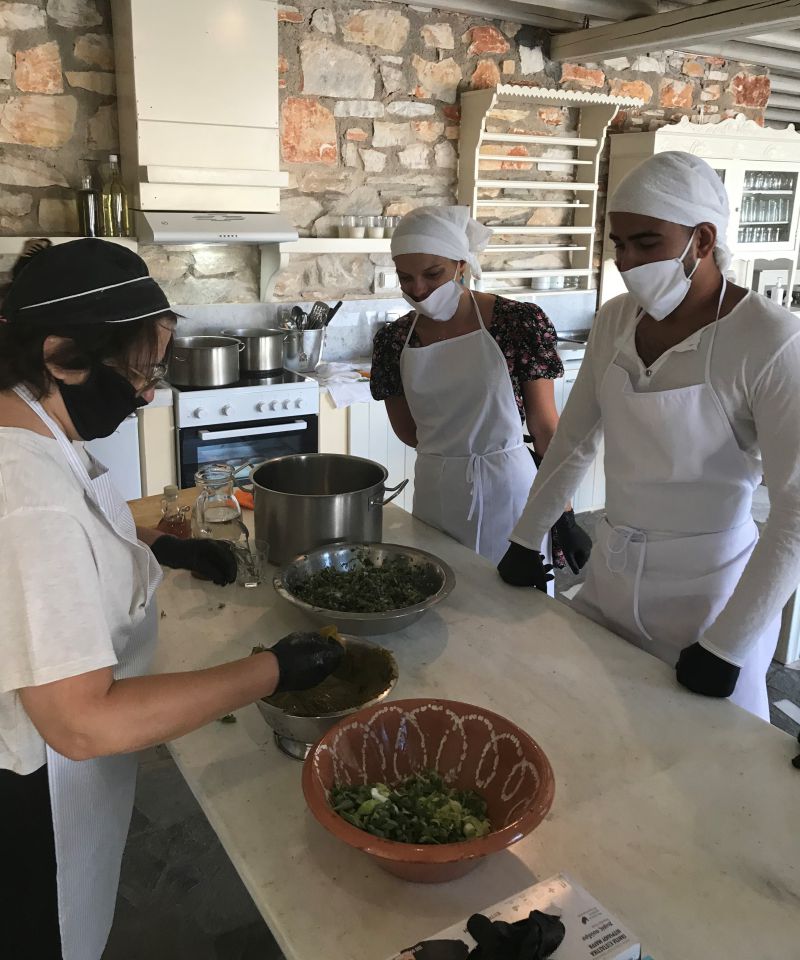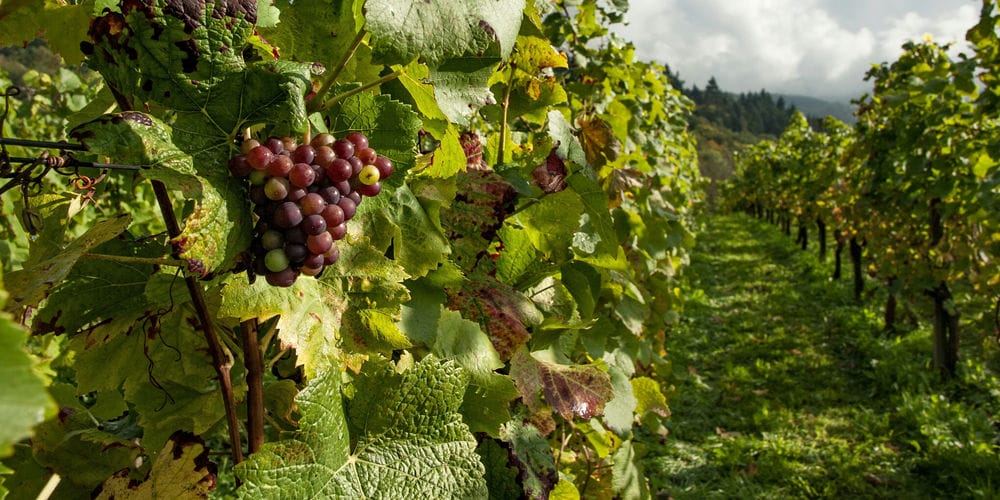
A Guide to Greek Spirits
The Greeks may be known more for their great food and folk dancing abilities and less for their range of alcoholic beverages, but you can rest assured that, as a nation, they know how to drink!
As one of the most ancient civilizations, Greece has a rich history in wine production and wine drinking, and although one could write an essay on the plethora of delicious Greek wines, this article will go into detail about some other Greek spirits that the average traveler would not likely know or hear about.
Read below the unique heritage and origins of the top Greek spirits, and make a toast to your upcoming vacation in Greece!
Ouzo

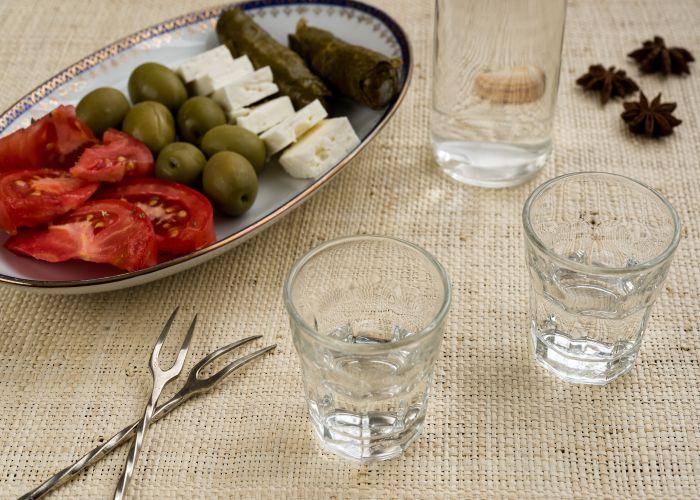
Ouzo is the most popular consumed distilled spirit in the whole of Greece and was introduced to the country along with the refugees that came from Asia Minor.
According to Robert Botet, who wrote an article in the Journal of Physics about the molecular makeup of ouzo, this substance is made from anethol oil which is found in anise plants (native to the Mediterranean region as well as the regions of China and Vietnam).
Other drinks you may know of that are made from anethol oil, are sambuca in Italy, raki in Turkey, and pastis in France. What connects these to ouzo is the unique way in which the drink dilutes in water: adding water makes the clear liquid turn into a milky white, semi-opaque color.
This spirit is especially popular in the summertime, and you will often see it accompanied by Greek meze (tapas) like grilled octopus, sardines, and fried squid.
This classic Greek spirit is also used as a home remedy: given its sky-high alcohol levels, it is used even today as an antiseptic. Greeks will also use lukewarm ouzo as a remedy for a bad toothache, or in the past; they would rub the spirit on tight muscles or joints.
Disclosure: Do not drink on an empty stomach and always mix it with water and ice! It is a sneaky drink that gets to you without you realizing it!
Tsipouro/Tsikoudia

Tsipouro, tsikoudia, and raki are all the same spirit and, unlike ouzo, they are grape distillates. The alcoholic grade of tsipouro is higher than ouzo and can, therefore, be considered stronger, but ouzo is said to give worse hangovers!
Tsipouro is believed to have originated in the 14th century in Mount Athos before spreading to the rest of Greece and Macedonia. Tsipouro can also have anise in it making it sweeter - more commonly found in the north of Greece.
This spirit is usually drunk straight and not diluted in water or ice, but always accompanied by lots of mezedes! If you come to Greece, be sure to visit an authentic tsipouradiko (meaning; the small restaurants serving tsipouro and meze dishes). The best are found in Volos, where you can order a 200ml bottle of tsipouro and get a free plate of mouthwatering mezedes.
Tentura
Tentura is a liqueur that has origins in the Greek city of Patra, located in the eastern part of the Peloponnese, back in the 15th century and is exclusively produced in Greece.
This herb and spice liqueur is typically potent with cinnamon and cloves, nutmeg and citrus fruits -spices that would be traded into Patra's port- as well as alcohol and sugar. Tentura is typically served in small shot glasses over ice or in cocktails, and usually after a meal as it can be employed as a digestive drink.
Kumquat Liquer of Corfu
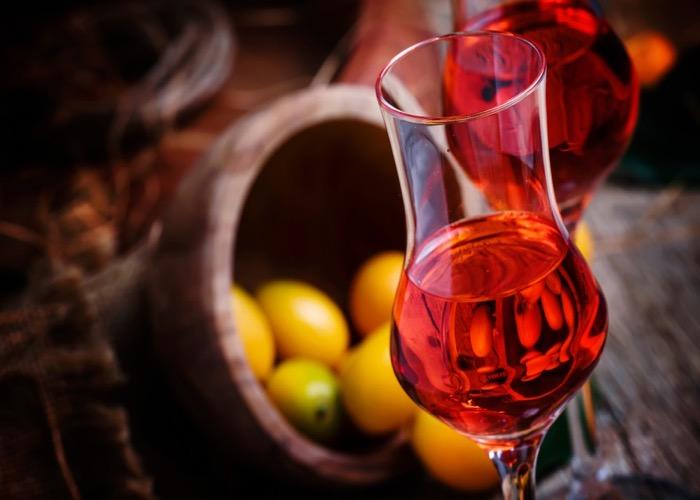
The most northwestern island of Greece, Corfu, has been home to the kumquat tree since 1924. The literal translation of Kumquat from Chinese is 'golden orange,' which is precisely what the fruit looks like.
It is a bitter-tasting citrus fruit that cannot be eaten raw, but the liqueur made from it is deliciously sweet and often described as the Greek version of Limoncello. The family-run distillery Mavromatis is perhaps the best-known producer of the liqueur on the island and demonstrates the multiple ways that the particular fruit can be consumed.
Mastiha of Chios

Another of Greece’s most famous liqueurs is the mastic of Chios. This PDO product is a flavored liqueur from the oil produced from the mastic tree, indigenous to the island of Chios, in the northeastern Aegean.
The mastic tree is the island’s trade secret and its cultivation goes as far back as ancient times.
Mastic trees actually grow all over the world, but Chios is the only place where the trees produce resins from their bark, which is what creates the distinctive taste.
The product had such economic leverage that the island was often victim to conquerors and pirate invasions.
Today, over 90% of the mastic produced is exported in various forms: chewing gum, spices, sweets, and of course, the delicious liqueur that one should not miss when visiting Greece!
Kitro of Naxos
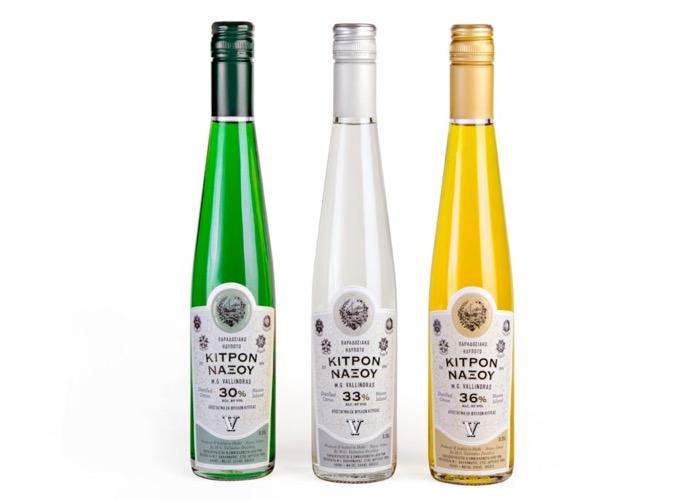
Flourishing on the Cycladic island of Naxos, the citron tree produces citron leaves from which the exclusive Kitro liqueur is made. According to the website Greek Federation of Spirit Producers, this is the driest and strongest of all Greek liqueurs, with 36% vol.
Despite its high alcohol content, Kitro of Naxos is particularly sweet and aromatic, making it a favorite of even those who do not like strong distillates. This is another PDO product, and it is produced in three main versions: white (strongest), green and yellow - making them very distinctive.
Vallindras Distillery is located in Chalki village and is open to the public - a must-see if you are visiting this beautiful island!
FAQs
What is Greek brandy called?
The local brandy of Greece is called 'Metaxa.' The basic differentiation and the uniqueness of 'Metaxa' is that essentially, it doesn't belong to any spirit category but moves comfortably between cognac, brandy, aged rum, and bourbon.
Is Metaxa a whiskey?
No, It's not. Is it cognac? No, because cognac comes exclusively from the French province of Cognac. Is it brandy? Not exactly.
'Metaxa' is a recipe that is secretly borrowed from French distillers but uses ingredients that are completely Greek. Its inspirer and owner of the company, Spyros Metaxas, was looking for the secret of enjoyment in an alcoholic beverage at the end of the 19th century. A soft, full taste that was not easy to find in drinks whose purpose was to numb you.
The famous vineyards of Samos give the sweet Moschato and give a soft note to 'Metaxa.' The French distillers used sugar for this purpose, but Spyros Metaxas envisioned a unique union.
Along with the wine distillate, which is the basis for every strong drink, he put in the famous sweet Muscat of Samos and let the time and the good wooden barrels do all the rest of the work.
Years of testing, perseverance, and love for the product have resulted in the Greek drink having fans from all over the world. Out of the approximately 10 million bottles produced exclusively in our country and at the company's facilities, almost 85% are exported to foreign countries.
What is the national drink of Greece?
The national drink of Greece is, of course, 'ouzo'! Ouzo is an alcoholic beverage with anise that is produced exclusively in Greece. Thanks to its essential oils of anise, anise, and fennel seeds, it creates a pleasant feeling of refreshment able to soothe even the hottest Greek summer.
What is Greek raki?
Raki is a distillate produced from marcs or Cretan grapes. Cretan raki is a different drink from Turkish raki since the latter is like ouzo, ie it has anise and double distillation, while tsikoudia does not.
Apart from being enjoyable, raki is also extremely pure since it has no dyes and no industrial alcohols. It also provides anxious and relaxing properties, as a result of which it delights our hearts and mind.
Hot tsikoudia, even if it is mixed with honey and cinnamon, helps to keep warm, which comes in handy in the winter months or during Christmas in Greece, while frozen tsikoudia helps to cool down.
What is the best Greek beer?
Greece has a pretty sizeable beer production industry, with a lot of local beers stealing the hearts of beer lovers from around the world. Some of its most famous brands include Fix, Mythos, Bios, Blue Island, Nisos, and Vergina.
A personal favorite is the beer of Alfa; however, it is all a matter of preference. There is no doubt that you will find one that you love among the local varieties, so don't be discouraged; try as many as you can!
How do you make Greek tsipouro?
Good grapes are a basic condition for the production of quality tsipouro. The fermentation of the marcs is also an important stage that concerns the taste and aromatic characteristics during the production process of tsipouro; therefore, its controlled conditions are necessary.
The distillation of the marcs for the production of tsipouro is a complex process that, in order to have a quality result, requires knowledge, experience, and modern technological equipment.
The distillation fractions are divided into heads, hearts, and tails. The heads have a high alcohol content and contain compounds with a pungent taste and aggressive aroma while the tails are superior alcohols with a heavy aroma and taste.
The heads and tails are removed and re-introduced into the distiller along with the next batch, while the heart, the highest quality part of the distillation after dilution, maturation, and filtration, is led to bottling.
Some spirits, after their selection, can be aged for years in oak barrels and, depending on the tsipouro and the aging conditions, acquire characteristics of spices, dried fruits, vanilla, chocolate, tobacco, leather, barrel, etc. The tsipouro that has not been stored in an oak barrel has a mainly fruity and floral taste, and it is less spicy.
In some areas of Greece, in addition to the marcs, aromatic seeds or plants (anise, fennel, crocus, walnut leaves, etc.) are added to the distiller in quantities and proportions that are usually a well-kept secret of each producer.
What is Greek grappa?
Greek grappa is called Tsipouro. Tsipouro is an authentic Greek product inextricably linked to the way of life, hospitality, and entertainment of the Greeks. It is the distillate of grape marc.
Its production begins with the selection of grape varieties, continues with the careful fermentation of their marcs (the skins that remain after pressing the grapes and the extraction of the must for the production of wine), and ends with their slow distillation.
Is raki the same as ouzo?
Absolutely not! The similarity of the products results from the turbidity that appears when diluting the two drinks with water and ice. In addition, they have a similar taste as both have anise. However, they are two completely different products.
The main difference between tsipouro and ouzo is that tsipouro has as its raw material the remnants of winemaking, ie, the skins of the grapes, which are fermented at low temperatures and give the aromas and special characteristics of the grapes.
At the same time, it is possible to add light aromas of fruits or herbs, while the distillation can be done 1-2 or even 3 times, depending on the nature of the distillate.
Ouzo, on the other hand, is a mixture of pure alcohol of agricultural origin with a wide variety of aromatic spices, fruits, nuts, or plants. Alcohol of agricultural origin is usually produced from distilleries and obtained by distillation after alcoholic fermentation of sugary and starchy agricultural products.
Various sweeteners are used as raw material, such as molasses, locusts, figs, plums, and wine, from which it is obtained by fractional distillation. This pure alcohol is then used to make ouzo.
Ouzo, unlike tsipouro, is usually only a small percentage of grape distillate. Produced by recognized and controlled distillers with pure alcohol, 96% vol of agricultural origin, and anise or pure anethole. The alcoholic percentage of tsipouro is usually higher than that of ouzo so tsipouro can be considered as a "stronger" drink.
Final Thoughts
Learning about the wide variety of exceptional Greek spirits is exciting because wherever you go in the country, you will find an extraordinary taste that you can’t find anywhere else.
From Athens, the mainland, and the Peloponnese to the northern Aegeannorthern Aegean, the Cyclades, and the Ionian islands: every corner of this beautiful country has something very special to offer, and it is all waiting to be discovered through our Greece tours and Greece vacation packages!







